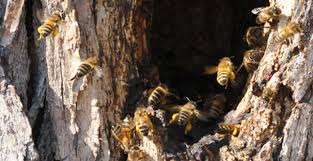Used for Both Architecture and Immune System Support, Propolis, A Bee's Success

We’ve discussed the many ways that propolis is good for us and our families but we haven’t looked at why bees collect propolis in the first place. Propolis a plant based resin is used to give a hive structure and to protect it against predators, microbes and pathogens. Bees collect propolis and distribute it throughout their hives. Propolis protects the hive from pathogens through its natural antimicrobial and antifungal properties. Without it bees would be subject to environmental stressors that could lead to their death. When building the hive they not only use the propolis in the architecture but they also create a propolis envelope, which surrounds the hive. This envelope acts as a antimicrobial layer for the hive. When building nests in the hollow of a tree for example the bees first layer the cavity with a layer of propolis that are ranges from 0.3-0.5mm thick. This keeps the hive waterproof, promotes stable temperatures and reduces microbial activity. In experiments bees with a propolis envelope have been found to have higher levels of Vg, an indicator that reflects that the bees are well-nourished. In general bees with adequate levels of propolis in their hives had better immune systems, which allowed for the longevity of the hive. Therefore, a colony of bees can be encouraged to build a natural propolis envelope within standard beekeeping equipment by modifying the inner walls of bee boxes. Perhaps propolis can, at least in part, help mitigate effects from threats to the hives durability.
Recent experiments have also shown that ingestion of propolis by the bees reduces the adverse affects of exposure to toxins produced by Aspergillus, a common hive fungus. Although bees do not naturally ingest propolis this might be a new way to help protect bees naturally from pathogen and stressors, brought on by bee farming. Feeding bees propolis would be similar to administering oral antibiotics. The exposure to propolis seems to prime the bee’s detoxification pathways giving them a leg up on fighting microbial and fungal infections. Understanding the role that propolis plays as a social immune defense directly against parasites and pathogens and through subtle, indirect effects on individual immunity and detoxification enzymes could be a key part of the puzzle to keeping our bees alive an well.
Pacific Resources International, Inc. carries only the finest CPLTM Propolis from New Zealand. We also have a wide range of healthy products made with the propolis like PRI Propolis and Manuka Honey Cough Elixir, Manuka Honey and Propolis Lozenges, PRI Children's Propolis & Manuka Honey Lollipops and Propolis & Manuka Oral Spray. Perfect to support a healthy lifestyle.
Source
Simone-Finstrom, M., Borba, R. S., Wilson, M., & Spivak, M. (2017). Propolis Counteracts Some Threats to Honey Bee Health. Insects (2075-4450), 8(2), 1-20. doi:10.3390/insects8020046
.














